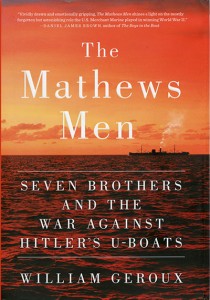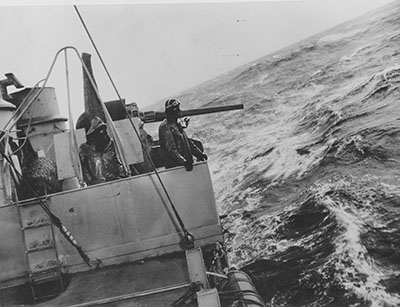 THEY WERE CRUEL SEAS INDEED. During the Battle of the Atlantic, men of the U.S. Merchant Marine paid a steep price to supply American and Allied forces around the world, suffering one of the highest casualty rates of the war—higher than the fabled Marines and more than four times than that of their comrades in the navy. Journalist William Geroux’s first book, The Mathews Men tells the little-known, largely underappreciated story of a group of stalwart mariners hailing from tiny Mathews County, Virginia—population just 7,500—located on a peninsula “spreading deep into Chesapeake Bay, in the shape of a tattered sail.”
THEY WERE CRUEL SEAS INDEED. During the Battle of the Atlantic, men of the U.S. Merchant Marine paid a steep price to supply American and Allied forces around the world, suffering one of the highest casualty rates of the war—higher than the fabled Marines and more than four times than that of their comrades in the navy. Journalist William Geroux’s first book, The Mathews Men tells the little-known, largely underappreciated story of a group of stalwart mariners hailing from tiny Mathews County, Virginia—population just 7,500—located on a peninsula “spreading deep into Chesapeake Bay, in the shape of a tattered sail.”
The odds were very much in favor of the marauding Germans at the outset. Unprotected vessels were torpedoed in sight of Atlantic seaboard cities, where blackout orders were often ignored, and oil tankers such as the Virginia were blown sky-high in the approaches to the Mississippi Delta. Twenty-five fatalities would result from the Virginia sinking in 1942. There would be 22 others from the Chesapeake community, which sent an extraordinary proportion of its men to fight at sea during the war, with more than half of fatalities suffered in 1942 alone.

Geroux focuses in particular on the Hodges family, whose seven sons joined the Merchant Marine; two of them would die at sea. Other men from Mathews served in every front of the Battle of the Atlantic, in more than 40 ships. Those lucky enough to survive a sinking often faced worse ordeals as they endured days or even weeks cast adrift in flimsy lifeboats. Yet many survivors boarded new boats almost as soon as they returned safely to dry land in Mathews; if they did not sign on with another ship, they became eligible for the draft, and most preferred the merciless ocean to a foxhole on a Pacific island or in Europe.
Winston Churchill recognized the merchant seamen’s contribution to Allied victory: “[They] displayed their highest qualities and the brotherhood of the sea was never more strikingly shown than in their determination to defeat the U-boat,” he wrote. Geroux shows how total victory was achieved, with three-quarters of Hitler’s commissioned U-boats—over 700—being sunk. This deeply researched and lovingly rendered account, based on years of hard on-the-ground reporting, is also a call to arms. Before the last of these 5,000-or-so men pass on, he stresses, they should be as celebrated and honored as those who served in the military during the war. Their courage and sacrifice were as critical in defeating Hitler as the heroics of their brothers in arms.
Best-selling writer Alex Kershaw is the author of the 2001 classic The Bedford Boys: One American Town’s Ultimate D-Day Sacrifice.
This review was originally published in the September/October 2016 issue of World War II magazine. Subscribe here.





